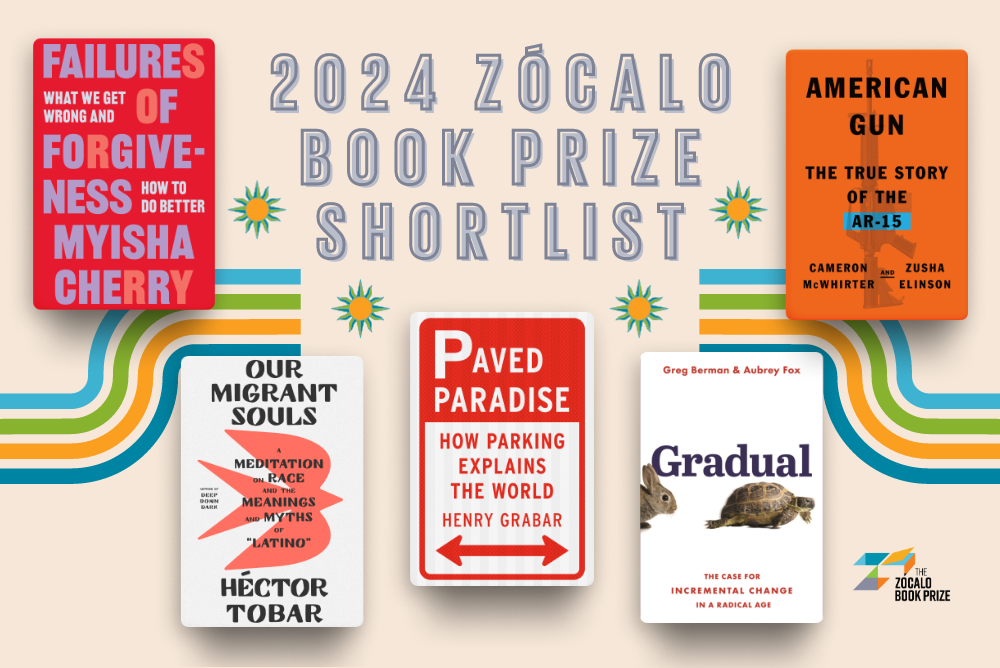
Illustration by Nick Yang/Zócalo.
What do incremental change, forgiveness, parking, guns, and race have in common? They are all forces that strengthen and/or undermine human connectedness, social cohesion, and community—and the subjects of the five books shortlisted for the 2024 Zócalo Book Prize.
Each year since 2011, Zócalo has honored the authors of nonfiction books on this broad topic, which has been central to our mission since our founding 20 years ago. This fall, publishers and authors submitted 180 books for consideration; our staff selected five shortlist titles to advance to our selection committee. We are delighted to recognize:
• Greg Berman and Aubrey Fox, authors of Gradual: The Case for Incremental Change in a Radical Age
• Myisha Cherry, author of Failures of Forgiveness: What We Get Wrong and How to Do Better
• Henry Grabar, author of Paved Paradise: How Parking Explains the World
• Cameron McWhirter and Zusha Elinson, authors of American Gun: The True Story of the AR-15
• Héctor Tobar, author of Our Migrant Souls: A Meditation on Race and the Meanings and Myths of “Latino”
Zócalo is grateful to screenwriter and philanthropist Tim Disney for his support of our literary prize program, which includes the 2024 Zócalo Poetry Prize (accepting submissions for original poems through January 22, 2024). We also thank this year’s selection committee: 2023 Zócalo Book Prize winner and The Fight to Save the Town author Michelle Wilde Anderson, Human Rights Watch chief communications officer Mei Fong, Marquette University historian Sergio González, creative director and Zócalo Advisory Board member David Lai, infectious disease specialist and professor of medicine Rekha Murthy, MD, Lawrence Welk Family Foundation president Lisa Parker, Smithsonian National Board chair Jorge Puente, MD, and LAXART director and curator Hamza Walker.
Stay tuned for the announcement of the 2024 winner of the Zócalo Book Prize in March. The winning author(s) will receive $10,000, deliver a lecture on their book, and take part in a live interview in the spring at the ASU California Center in Los Angeles. They’ll also join a distinguished group of our previous winners:
• Michelle Wilde Anderson, The Fight to Save the Town: Reimagining Discarded America (Avid Reader Press / Simon & Schuster)
• Heather McGhee for The Sum of Us: What Racism Costs Everyone and How We Can Prosper Together (Penguin Random House)
• Jia Lynn Yang for One Mighty and Irresistible Tide: The Epic Struggle Over American Immigration, 1924-1965 (W. W. Norton & Company)
• William Sturkey for Hattiesburg: An American City in Black and White (Belknap/Harvard University Press)
• Omer Bartov for Anatomy of a Genocide: The Life and Death of a Town Called Buczacz (Simon & Schuster)
• Michael Ignatieff for The Ordinary Virtues: Moral Order in a Divided World (Harvard University Press)
• Mitchell Duneier for Ghetto: The Invention of a Place, the History of an Idea (Farrar, Straus and Giroux)
• Sherry Turkle for Reclaiming Conversation: The Power of Talk in a Digital Age (Penguin Press)
• Danielle Allen for Our Declaration: A Reading of the Declaration of Independence in Defense of Equality (Liveright Publishing)
• Ethan Zuckerman for Rewire: Digital Cosmopolitans in the Age of Connection (W. W. Norton & Company)
• Jonathan Haidt for The Righteous Mind: Why Good People Are Divided by Politics and Religion (Pantheon)
• Richard Sennett for Together: The Rituals, Pleasures and Politics of Cooperation (Yale University Press)
• Peter Lovenheim for In the Neighborhood: The Search for Community on an American Street, One Sleepover at a Time (Perigee Books)




Send A Letter To the Editors